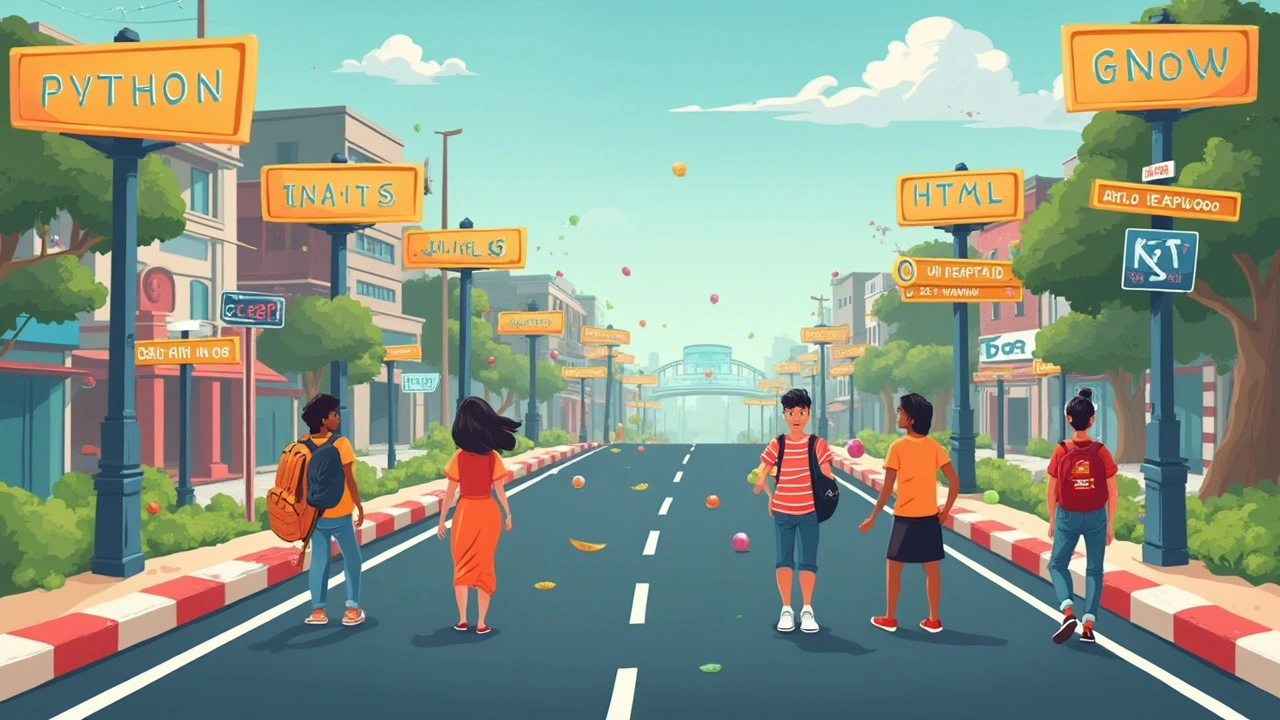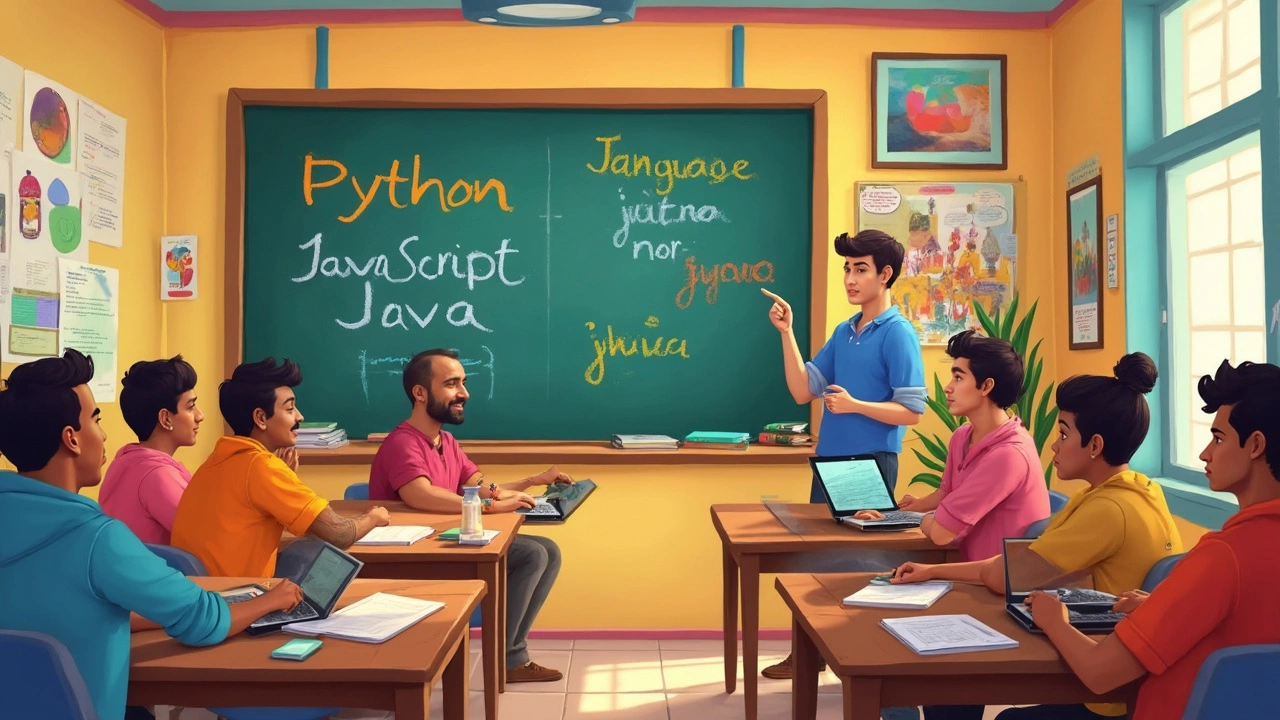Feel completely swamped by all the coding languages out there? You’re not alone—more than half of beginners admit they picked their first language almost at random. That’s wild, considering your choice can make a huge difference in how fast you learn, what projects you can build, and even which jobs you land later.
The most popular options are everywhere: Python, JavaScript, Java, C++, and Ruby all battle for the top spot. But here’s the thing nobody tells you—there’s no one-size-fits-all answer. Some are friendlier if you’ve never coded a day in your life. Others unlock specific fields like web design, game dev, or data science. All of them look scary at first, but each has little perks that can make your journey smoother.
So instead of scrolling through endless Reddit threads, let’s lay out what really matters when you’re starting. I’ll break down the top choices, why you might care about one over another, and a few hard-earned lessons from the trenches. Ready to stop guessing and start coding smart? Hang tight—let’s get you set up for success.
- How Choosing the Right Language Changes Everything
- The Top Contenders: Python, JavaScript, and More
- Matching Languages To Your Goals
- Real Talk: Rookie Mistakes and Smart Shortcuts
How Choosing the Right Language Changes Everything
Your first coding language shapes the entire way you think about code. It can mean the difference between building your first app in a weekend or just staring at cryptic errors for weeks. That’s not exaggeration—about 70% of beginners who stick with coding started with a language that matched their learning style or goals.
Some languages, like Python, are known for their simple, readable code. Python actually looks like plain English, which is why teachers and universities push it so hard for newbies. Compare that to C++: it’s powerful for big projects but can make you hate coding after the tenth time you forget a semicolon.
Picking the right one isn't just about what’s trendy. It impacts:
- Your frustration level—Some languages are way more forgiving when you mess up.
- The projects you can start—JavaScript is a must for websites, but pointless if you dream of building a robot pet.
- How fast you get called back for jobs—Companies hiring for junior devs often list one or two specific languages. No use learning Ruby if every job in your city wants Java.
If you start with a tough language, you might pick up good habits (and some thick skin), but you could also quit before seeing what coding can really do for you. Meanwhile, an easy intro language lets you build confidence, finish real projects, and actually have a little fun. That’s why so many free online courses and bootcamps lead with Python or JavaScript—they want you to see results, not just theory.
Bottom line: choosing your first coding language isn’t just a technical decision. It’s about setting yourself up to enjoy the process and reach your goals without extra stress. Don’t let someone else’s favorite sway you—the best language is the one that fits the way you want to learn and what you want to build.
The Top Contenders: Python, JavaScript, and More
It feels like everyone has strong opinions about which coding language is “the best” for beginners. But let’s break it down based on what actually helps you learn faster and get stuff done. Here are the top choices every newbie runs into and what makes each one stand out.
- Python: This is the friendliest language out there. Its code reads almost like regular English, which is why it’s the first pick in tons of intro classes and coding bootcamps. The coolest part? Python basically powers half the internet these days, popping up everywhere from YouTube’s backend to NASA’s data crunching. It’s massive for data science, AI, simple web projects, and even small games. Stats back this up: in the Stack Overflow Developer Survey (2024), over 43% of developers said Python was their "most loved" language for getting things done fast.
- JavaScript: If you want to mess around with web pages or build cool interactive sites, JavaScript is your jam. It’s what makes 97% of all websites actually function—think slideshows, pop-ups, that sort of thing. Learning JavaScript gets you job-ready for web development and lets you see results in your browser instantly, which is a huge motivator. Plus, as you get better, you can use the same language for backend and app-building with tools like Node.js.
- Java: A bit more old-school, but still a big deal, especially if you want to build Android apps or work for enterprise companies. Java is on millions of devices—from toasters (seriously) to big banking systems—and has a reputation for being solid and reliable. The downside for beginners? It’s pickier about how you write things, and there’s more “setup” before you see results.
- C++: If you’re dead set on games, high-speed stuff, or hardware, people will hand you C++. It’s tougher to learn because it’s less forgiving, but you get total control of what the computer does. That’s why it powers everything from AAA video games to high-frequency trading platforms. Usually, beginners start here only if they know for sure this is their goal.
- Ruby: Ruby was once the web darling, especially with its Rails framework that let people build sites fast. Its community is famous for being welcoming, and the code’s pretty easy to read. Not quite as trendy as Python or JavaScript now, but still a solid choice if you want simple web projects.
But what do real usage stats look like?
| Language | Beginners (First Language) | Developers Using Daily (%) |
|---|---|---|
| Python | 38% | 49% |
| JavaScript | 34% | 66% |
| Java | 14% | 35% |
| C++ | 8% | 23% |
| Ruby | 4% | 9% |
Notice anything? Most folks go with Python or JavaScript for their first language. That’s because they’re a breeze to get started with and give you way more instant feedback. But if you have a specific goal—like building an Android app or working with hardware—don’t be afraid to veer off the beaten path. You want the language that fits what you actually want to build.

Matching Languages To Your Goals
No point learning something you’ll never use. Picking the right programming language comes down to what you actually want to build. You wouldn’t use a hammer to paint a wall, right? Same logic here. Let’s break it down by real-world goals and which languages line up easiest with each one.
Python is the go-to for beginners who want fast results, especially if you’re curious about data analysis, automation, or even dabbling in AI. Instagram, Spotify, and Netflix use Python for cool stuff behind the scenes. It’s the top choice for Americans just getting into code—over 40% picked it for their first language in 2024, according to Stack Overflow’s big survey.
If web development or anything with websites catches your eye, you’ll need JavaScript at some point. It powers all the interactive parts of most websites—sliders, pop-ups, live chats, the works. In fact, all modern browsers, whether you’re on Chrome or Firefox, rely on JavaScript for page logic. Over 98% of websites use it—so it’s everywhere, and jobs are steady.
Love the idea of mobile apps? If you’re reaching for Android, Java and Kotlin rule the roost. For iPhones, you’re looking at Swift. Gaming? C++ is still huge, powering big studios and major game engines like Unreal.
Here’s how popular choices stack up against common paths:
| Goal | Best Language(s) | Who Uses It? |
|---|---|---|
| Web Development | JavaScript, HTML/CSS | Google, Facebook |
| Data Science/AI | Python | Pinterest, NASA |
| Mobile Apps (Android) | Java, Kotlin | Airbnb, Twitter |
| Mobile Apps (iOS) | Swift | Uber, LinkedIn |
| Game Development | C++, C# | Epic Games, Unity |
Here’s a quick tip: don’t chase what’s "hottest" just because everyone’s talking about it. Think about the stuff you use day-to-day—a cool mobile app, a game, a data visualization—and track backwards to see what language built it. That way, you stay interested and avoid quitting mid-learn like almost 70% of folks who pick a random language, then burn out. Focus on the skills that fit your goals, and it’s way easier to keep coding when tutorials get tough.
- If you love tweaking websites or want instant visual feedback, JavaScript is your new best friend.
- For crunching numbers, making smart predictions, or scraping data, Python will get you farther, faster.
- Ready to launch apps on millions of devices? Learn Swift for iOS, or Java/Kotlin for Android.
- Dreaming of making games? C++ isn’t the easiest, but it’s what the pros use for a reason.
So, map your goal, pick your tool, and remember—the best way to learn is by building something you actually care about.
Real Talk: Rookie Mistakes and Smart Shortcuts
Almost everyone fumbles the beginning. It’s so easy to get excited and then end up frustrated a week later. Let’s rip off the bandage and talk about the top rookie mistakes when picking your coding language and a few shortcuts that actually work.
- Jumping into syntax over concepts: Tons of beginners obsess over where the semicolons go, but ignore things like loops and variables. Get the big ideas first—most of them carry over to every language.
- Taking too many tutorials, finishing none: "Tutorial purgatory" is real. You end up knowing a bit about everything but can’t make anything from scratch. Commit to one beginner project and finish it, even if it’s ugly.
- Ignoring error messages: It feels like the programming gods are yelling at you in another language. Truth is, those messages are clues. Copy-paste them into Google, and you’ll be shocked how fast you find answers.
- Skipping documentation: The official docs are boring, but they’re gold. Start simple—learn to find and use examples in docs. This is a skill every programmer needs.
More than 64% of new coders give up before finishing their first project, according to a 2024 Coding Newbies Survey. That’s not because they’re not smart—usually, it’s the result of feeling lost or overwhelmed by details.
| Common Rookie Mistake | How To Fix It |
|---|---|
| Not building anything real | Start a small project, like a number guessing game or simple website |
| Learning multiple languages at once | Stick to one until you’re comfortable |
| Getting discouraged by errors | Google every error message, and read discussion threads on Stack Overflow |
| Copy-pasting code without understanding | Write code line by line and make tiny changes to see what breaks |
Here's a quote that nails the mindset you need:
“The best way to learn to program is by doing—writing real code to solve real problems.” — Guido van Rossum, creator of Python
If you want a shortcut, focus on one language for now. Python and JavaScript have free interactive sites like Replit and CodePen where you can write and see your code run instantly, without any setup. Don’t worry about being "behind" or "too old." The internet is full of self-taught coders who started in their 30s, 40s, and even 50s.
Finally, join a small online community to keep you going. Look for freeCodeCamp or a local Discord group for beginners. Ask questions, show off your broken code, and celebrate small wins. That’s way more effective than studying alone for months.

